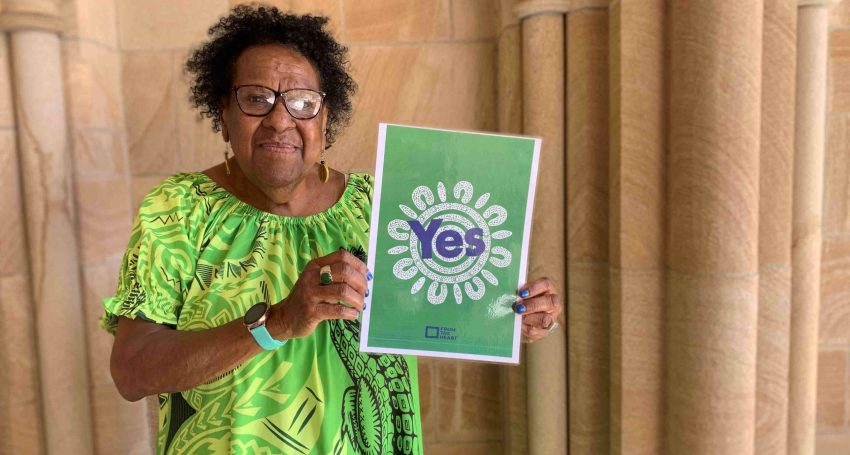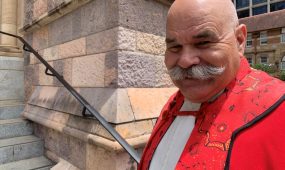Why I support constitutional recognition through an Aboriginal and Torres Strait Islander Voice to Parliament: Aunty Dr Rose Elu
Justice & Advocacy
“The forthcoming referendum about recognising Aboriginal and Torres Strait Islander peoples in the Constitution through a pragmatic Voice to Parliament builds on the remarkable legacy of the 1967 referendum. I am hopeful that this year’s referendum will be a success and I look forward to seeking to contribute my views as Parliament consults with Aboriginal and Torres Strait Islander peoples about the model,” says Aunty Dr Rose Elu

Story Timeline
Why I am voting “yes” in the referendum
- Why I am voting “yes” in the referendum: Sue Cooke
- Why I am voting “yes” in the referendum: The Ven. Geoff Hoyte
- Why I am voting “yes” in the referendum: Phyllis Marsh
- Why I am voting “yes” in the referendum: Bishop Daniel Abot
- Why I am voting “yes” in the referendum: Adrian Malone
- Why I am voting “yes” in the referendum: The Rev’d Cameron Freese
- Why I am voting “yes” in the referendum: The Rev’d Rick Gummow
- Why I am voting “yes” in the referendum: Uncle Milton Walit
- Why I am voting “yes” in the referendum: Marilyn Wright
- Why I am voting “yes” in the referendum: Barry Kuskopf
- Why I am voting “yes” in the referendum: Aiden Wu
- Why I am voting “yes” in the referendum: Reg Dean
- Why I am voting “yes” in the referendum: Jill Rylatt
I remember voting in the 1967 referendum. At the time I was living in Seisia at the tip of Australia on the Cape York Peninsula. My family moved there in the late 1940s when I was very young because we needed to leave our Torres Strait Island home of Saibai for the Cape to seek safety from the threat of tsunami and malaria.
The 1967 referendum achieved two important things for my people. We were subsequently counted in the census as part of the Australian population and the Commonwealth was enabled to make laws for us under Section 51 of the Constitution. Prior to the 1967 referendum much of what we could and could not do was controlled by state-based legislation.
Advertisement
This included seeking permission to travel within Australia. For example, if we wanted to leave Seisia and visit family on Saibai we were legally required to seek permission from government authorities. I remember being counted on passenger boats when we left the reserves – being lined up and counted by Queensland Native Affairs Office big shots who threw boiled lollies on the ground for us to pick up. My father, who was a chief, even had to seek permission for me to move to Melbourne so I could study.
The successful 1967 referendum was also a significant catalyst for the dismantling of state-based assimilation policies.
Over 90 per cent of voters voted “yes” in the 1967 referendum in what was to become a watershed moment in our shared history, especially in the way it united us. I pay my respects to all those who campaigned in the lead up to the 1967 referendum – both Aboriginal and Torres Strait Islander peoples and non-Indigenous peoples alike.
Advertisement
The forthcoming referendum about recognising Aboriginal and Torres Strait Islander peoples in the Constitution through a pragmatic Voice to Parliament builds on the remarkable legacy of the 1967 referendum. I am hopeful that this year’s referendum will be a success and I look forward to seeking to contribute my views as Parliament consults with Aboriginal and Torres Strait Islander peoples about the model.
Editor’s note: The Anglican Church Southern Queensland supports constitutional recognition through an Aboriginal and Torres Strait Islander Voice to Parliament. For campaign resources and more information, please visit the YES23 website.
Editor’s note 15/03/2023: The ACSQ supports the Anglican Board of Mission’s 2017 call for “a Constitutionally Entrenched First Nations Voice”. The ACSQ also supports the Anglican Church of Australia’s Joint Affirmation of Faith and Justice with First Nations Peoples (carried by affirmation at General Synod, Oct 2007), and seeks practical ways to do so, including our association with Reconciliation Australia and the prescribed process of Reconciliation Action Plans.
Editor’s note: 21/07/2023: This anglican focus feature, written by The Ven. Geoff Hoyte, The Rev’d Michael Stalley and The Rev’d Rick Gummow, provides a timeline showing how the ACSQ came to its position on recognising Aboriginal and Torres Strait Islander peoples in the Constitution through a Voice to Parliament.





